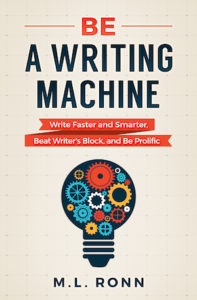500 words today. I got a lot done this weekend.
First, I got the large print proof of The Author Estate Handbook and approved it. It should be available in a few days. I’m officially now into large print distribution. I’ll be doing it moving forward where it makes sense. They’re quite easy to create, actually.
Next, I developed a set of macros that will help me format manuscripts correctly for large print edition in a fraction of the time.
I also did quite a bit of quality-checking on my books this weekend. There were a few things I wanted to update across a handful of my titles.
First, Amazon opened up Expanded Distribution for a few new countries over the past year or so. I hadn’t updated it for most of my titles, so I went through and did that.
Second, Books2Read now allows you to segment your links by ebook, print, and audiobook. I updated my most popular titles back when they released the feature, but I spent time this weekend updating all of my links so that they now have ebook, print, and audio links. A smart thing to do because it will increase my sales long-term. If you want to see an example of a “decked out” B2R link, visit the one for Be a Writing Machine at https://www.books2read.com/beawritingmachine
Third, I am preparing to relaunch my Good Necromancer series under my Michael La Ronn pen name. Some of of my titles have a “Other Books By” that reference the M.L. McKnight pen name. I fixed that so that all books moving forward don’t have M.L. McKnight mentioned. I’ll eventually reupload new editions to all retailers over time.
Otherwise, my book portfolio is in great shape compared to just a few months ago. I’m at the point where, when retailers announce new changes or items that need to be corrected, I can do it with the speed, ease, and efficiency of an author that has way, way, fewer titles published than me. And best of all, my current process is highly scalable.
I’ve created a master publishing file that contains just about everything you can think of for all of my books. It took a while to create, but it’s paying off dividends now.
In seconds, I can identify which titles across my portfolio are affected by a change. Then, within an hour, I can have the changes made, new versions of the books uploaded, and every dated and documented in my logs so that I know when I made a change and why. It’s good stuff, and I’m finally at a point where I don’t have to spend too much time quality checking anymore. Now, I just choose to QA a handful of titles each quarter to check for any issues, but everything should be mostly quiet now.
When you have almost 80 books, you have to be really organized or things just get out of control.
(For anyone interested in how I got organized, read my book Keep Your Books Selling: https://authorlevelup.com/selling).
ACX EXCLUSIVITY
Someone asked me to cover ACX audiobook rights/exclusivity.
Authors have two choices when distributing their titles to Audible. You can be non-exclusive, meaning you can publish the title on Audible and elsewhere. This means you have to pay out of pocket for the recording.
You can also be exclusive, meaning your book will only be available on Audible (and Amazon and Apple Books). If you choose exclusive distribution, you can still pay out of pocket, but you can also choose “royalty share”. In a royalty share, the author and narrator split the royalties. Early on, many authors chose royalty shares because it was a free and high quality way to get audiobooks created.
For the book in question, I chose royalty share. But the fine print is what gets you…when you choose a royalty share, it’s in perpetuity. Forever. What happens if you need to make a change to the book (such as a cover change) but the narrator is dead? The book will be dead in the water.
You have two options if you’ve signed a royalty share: do nothing and hope for the best or buy out the narrator. If you read the ACX terms, they state that you can dissolve a royalty share if (and only if) the author and narrator both agree.
In my case, I evaluated the audiobook and made my narrator an offer based on what I would have paid them if I had paid them to produce the book seven years ago, how much the book earned, and a few other factors. I reached out to the narrator and made them an offer.
We came to an agreement and I drafted a contract that we both signed (thanks law school, LOL). The contract said that we would both email ACX and request to dissolve the royalty share agreement and remove the title for sale. Once ACX remove the title, I would pay. If ACX refused, then I wouldn’t be required to pay.
The narrator and I emailed ACX, and 2 weeks later, they removed the title from sale. And then, I got the rights back to the audiobook. I can now do whatever I want with the recording because I own the copyright to it. I’ll probably keep this one off the market and re-record it down the road.
Do you have to buy out your narrator? No, but that’s the only incentive for them to agree. After all, they’re going to lose out on sales. That’s why ACX royalty shares can be expensive to correct if you did them for the wrong title.
Anyhoo, I’ve got a manuscript to write. Have a good night.

